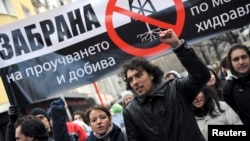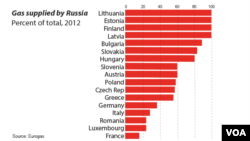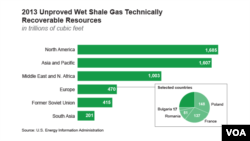As the U.S. wages a high-profile campaign against Russia over Ukraine, it is also battling Kremlin-dominance on another front - energy in Eastern Europe.
NATO member Bulgaria, which relies on Russia for 85 percent of its natural gas and all its nuclear fuel, is on the frontline of this confrontation.
“For Russia, energy has always been a means for the Kremlin to extend its geo-political priorities and the financial interests of certain people involved,” said former Bulgarian energy minister Traicho Traikov.
“Economic benefits come last. Enough people in Bulgaria owe favors to Russia so [this policy] is successful,” he said.
The U.S. recently pledged to send an energy envoy to Sofia and is promoting an American company to build a nuclear power plant there. Washington is also looking to help fund new gas pipelines and terminals in the region.
“In the area of energy security, we're not just talking the talk, now we're walking the walk," U.S. Assistant Secretary of State of European Affairs Victoria Nuland said in January of U.S. intentions.
Her boss, U.S. Secretary of State John Kerry, visited Bulgaria for economic discussions earlier this year.
“A lot of time" was spent discussing energy security, Kerry said, adding that Bulgaria needs to find new sources.
The U.S. moves come amid renewed charges that Russia – through its state-controlled energy company, Gazprom – has successfully blocked shale gas exploration in Bulgaria through a shadowy but well-funded campaign waged to protect its regional energy dominance.
“Along with the massive drop in energy prices, hydraulic fracturing constitutes the greatest threat to Russian financial and political influence in Europe and to future Russian tax receipts,” said Keith Smith, a former U.S. ambassador to Lithuania with additional posts throughout Europe.
He and other former U.S. and European officials and energy experts who spoke with VOA outlined an effort by which Russian officials, working with foreign consultancies in Brussels, have financially supported anti-fracking activities in several European countries.
Bulgaria’s shale U-turn
Despite paying some of the highest prices in the world for energy, Bulgaria in 2012 issued an open-ended ban on hydraulic fracturing, cancelling a license for unconventional gas exploration granted less than six months earlier to the U.S. energy giant Chevron.
When anti-fracking protests quickly spread to other East European countries with little prior interest in ecological issues, a number of high-ranking officials and energy experts pointed to Russia.
Moscow’s position as the principal supplier of expensive European natural gas imports means huge profits for the Kremlin, which raises about 60 percent of its federal revenue from energy exports.
Along with Bulgaria, Hungary, Finland and the Baltics also receive nearly all their gas from Russia; Germany, the world’s fourth largest economy, depends on it for almost 40 percent of its supply.
“Their influence is continuing. Russia will do anything to disrupt production, especially in Central and Eastern Europe,” Smith said.
Russia and Gazprom have denied the accusations, as have Bulgarian environmental groups.
“This is very bad propaganda. Nothing’s been proven, no one’s been named as a paid agent of the Russians,” said Borislav Sandov, co-founder of the Bulgarian Green Party and spokesman for Fracking Free Bulgaria, a leading environmental group.
Much of Europe’s anti-fracking movement, as in the United States, stems from real environmental concerns.
Activists point to evidence linking fracking to groundwater contamination as having galvanized popular opinion and governments against the controversial drilling technique by which water, sand and chemicals are pumped underground to retrieve oil or natural gas.
But when it comes to Eastern Europe, the allegations against Russia and its ties to environmentalists are public and widespread.
“[The Russian campaign] is no secret. The U.S. knows through diplomatic channels, but previously didn’t have the resources or urgency to act. Ukraine changed the game. The West doesn’t want to be friends with [Russian President Vladimir] Putin anymore,” Traikov said.
Before stepping down last year, former NATO Secretary General Anders Fogh Rasmussen openly accused Moscow of aiding Europe’s anti-fracking movement.
“Russia, as part of their sophisticated information and disinformation operations, engaged actively with so-called non-governmental organizations – environmental organizations working against shale gas – to maintain European dependence on imported Russian gas,” Rasmussen said.
Evidence for the alleged Russian campaign is based mainly on financial links and anecdotal accounts.
“The money trail is very difficult to trace,” said Margarita Assenova, an analyst at the Washington D.C.-based Jamestown Foundation.
“[But] at least two Brussels-based consultancies allegedly transferred funds to several Bulgarian environmental groups through local corporate structures connected with Russia,” she said.
“The assets initially went through Overgas, Gazprom’s Bulgarian subsidiary, and the lobby supporting Russian nuclear energy projects. Both have been used in the past to promote Gazprom’s interests.”
Overgas dominates the Bulgarian market for licensing and drilling, said Ilian Vassilev, managing partner of the Sofia-based consultancy Innovative Energy Solutions and a former Bulgarian ambassador to Moscow.
“They can make life for [multinational oil] companies very difficult – challenging them in court, sitting on exploration blocks for years doing nothing,” he said.
Chevron vs Gazprom
When Chevron moved into Bulgaria in 2010, it became the single largest investor of the shale era.
“They introduced a completely new business culture, put down €30 million [$38 million] up-front. It was an unheard of amount of money and triggered a chain reaction when the Russians realized Chevron meant business,” Vassilev said.
He described a process by which groups that normally have nothing to do with one another saturated the public with misleading information about shale gas, creating a climate of mistrust and fear.
“It was a sophisticated effort, indirectly funded, mainly involving nationalists and leftists, including the Socialists’ Russophile wing,” Vassilev said. “The funds were directed to local NGOs, Orthodox Church-related organizations, media and sports clubs.”
The tide peaked on January 14, 2012 with rallies in at least six major cities, three European capitals and a 60,000-strong Facebook group backed by a sophisticated media campaign and pledges of support from local officials.
Bulgaria’s shale gas hysteria was a manufactured public relations campaign, although it did reflect genuine environmental concerns, Traikov said.
“When Chevron paid the €30 million signing bonus, the pro-Russian media immediately started trumpeting ‘kickbacks.’ That’s how reality was perverted,” he said.
A Sofia-based source contacted by VOA pointed to “businesspeople serving as intermediaries for Russian corporate interests” as key components to the moratorium’s success.
But detractors say incompetence, rather than a Kremlin-led conspiracy, is the key reason unconventional gas failed in Bulgaria and why the country remains so dependent on Russian energy.
“The entire energy sector is a mess. It’s heavily politicized, with huge turnover in personnel and not conducive to business,” said Andreas Goldthau, an energy expert at Harvard’s Belfer Center whose teams interviewed protest groups, activists and government officials in the Balkan country.
Yet those who see Russian fingerprints on Bulgaria’s energy maneuvers remain resolute.
“Sofia is a small city that can’t keep secrets for long when it impacts something as big as this,” Vassilev said.








